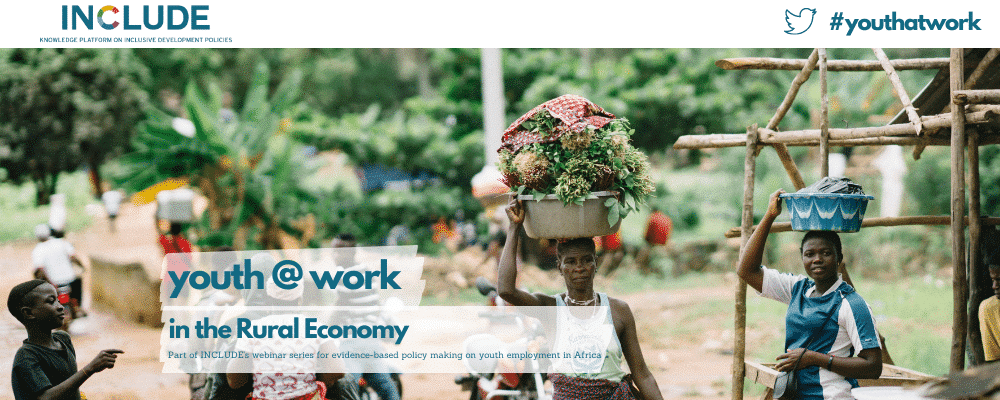
What is the potential of the rural economy to provide employment opportunities for youth, in- and off-farm? This was the main question of this week’s Youth@Work webinar, hosted by INCLUDE, with the support of Canada’s International Development Research Centre (IDRC) and the International Labour Organization (ILO). During the Youth@Work webinar series, researchers, practitioners, policymakers and youth come together to share knowledge and good practices on youth employment in Africa. This article presents the key insights emerging from the online event.
Most of the world’s poor today are found in rural Africa, and forecasts suggest that this concentration might become more even pronounced if current trends continue. Despite increasing urbanisation, projections estimate that around half of Africa’s new jobseekers will need to find employment in rural areas, at least until 2030. In Sub-Saharan Africa in particular, around 60 per cent of the youth population is expected to continue to live in rural areas for at least the next decade. However, the prevailing informality and the poor quality of employment in both farm and non-farm segments of rural economies in Africa remains a serious concern and rural youth in Africa continue to face challenges related to unemployment, under-employment, and poverty. Therefore, when it comes to youth employment, the key question is: What is the potential of the rural economy to provide employment opportunities for youth in Africa?
Multiplier effect
Justin Flynn, research officer and doctoral researcher at the Institute of Development Studies (IDS), highlighted the importance of investing in agriculture as the engine for economic growth in the rural economy. As Flynn and Thomas Yeboah, Research Fellow with the Bureau of Integrated Rural Development (BIRD), in Ghana argue in their evidence synthesis paper (ESP) on the rural economy: ‘Agriculture must play a central role in the structural transformation of Africa’s rural economy, both to alleviate poverty and to improve employment opportunities.’ Increasing the productivity of the agricultural sector by investing in and ensuring access to key resources such as infrastructure, land, inputs, credit, and extension services, can improve agricultural productivity and help unlock markets to enable producers to take advantage of economic opportunities in the rural African economy.
This, argues Flynn, is not only important in creating jobs for youth in the agricultural sector, but can also have spill-over effects to other sectors such as the service and retail industries. Research shows that $1.00 extra generated in agriculture can generate up to $4.00 in extra income and increased non-farm employment through linkages with different sectors. Consequently, investing in increasing agricultural productivity can have a multiplier effect when it comes to the rural economy. Case in point is Ethiopia, which managed to more than halve the poverty rate in the country between 2005 and 2015 by investing heavily in agricultural intensification.
Addressing barriers through a system-wide approach
To fulfil this potential of the rural economy for youth employment in Africa, Patience Kikoni country lead in Uganda for the Challenge Fund for Youth Employment (CFYE) of Palladium, stresses the need to understand youth’s aspirations and barriers when it comes to finding employment in the rural economy. Barriers, such as a lack of access to land or credit, a lack of negotiating power, limited growth opportunities in the agricultural sector and poor job security can limit youth to reap the benefits of a rural transformation as Flynn described. Addressing these barriers requires innovative business solutions that can work around these issues, explains Kikoni. For example, by linking young people who don’t have access to land to farmers with land and investing in last-mile delivery systems for youth working in non-farm related jobs. Capitalising on existing rural structures, such as agricultural extension workers, community health workers can in this regard help scale businesses even further, thereby providing additional income and employment opportunities for youth.
Elisenda Estruch-Puertas, rural economy and agriculture specialist at the International Labour Organization (ILO), agrees with Kikoni that it is important to look at the different challenges that youth are facing in the rural economy. According to Estruch-Puertas, these challenges are multidimensional and also include non-agricultural challenges, such as a lack of access to public goods and services, like health, education and electricity in rural areas. The COVID-19 pandemic, highlighted and exacerbated these challenges and showed that many of these issues are interrelated. In order to stimulate employment in the rural economy and facilitate an inclusive post-pandemic recovery, we therefore need a system-wide and integrated approach, argues Estruch-Puertas, with a strong focus on global partnerships.
Responding to a question from one of the webinar participants on the role of gender in the rural economy, Estruch-Puertas adds that it is important to pay particular attention to women as agents of change in the rural economy and employ a gender sensitive approach when it comes to stimulating youth employment. ‘There are many gender inequalities in the world of work, in particular in the rural economy’, Estruch-Puertas recognises: ‘Although women play a key role in food security, their efforts are in many cases unrecognised’. In addition, she explains, patriarchal social structures prevent many young women from accessing land, which also limits the possibility to use land as a collateral for getting access to finance and start their own business. A lack of access to higher education for young women also hampers their skills development,d which presents another barrier to secure decent employment in the rural economy.
Youth engagement beyond tokenism
During the webinar, all speakers highlighted the importance of ensuring that the voices of the youth are heard and young people are engaged in the policy process. However, in practice, as youth representative Judith Akello recognised in her contribution: “most policymakers want to think for you and design policies that they think are good for the youth. However, Akello elaborates, policymakers hardly visit the rural areas and therefore don’t know what is happening on the ground. Therefore, to design effective youth employment policies, youth have to be involved in the decision-making process: ‘Youth have the potential to think for themselves and need to be engaged in things that concern their lives.’ Moreover, this engagement should according to Akello, not just be between youth representatives and policymakers, but also between youth themselves. In this regard she highlights the importance of programmes like the Youth in Agroecology Learning Track Africa (YALTA) initiative that seeks to support young agroecological entrepreneurs. ‘By interacting with each other in YALTA, for example by visiting each other’s farms, youth can learn from each other and become inspired. Personally, had I not met other youth, I would have never gotten involved in agriculture’.
Estruch-Puertas agrees with Akello and underscores the need to go beyond a tokenistic approach when it comes to youth participation by involving young people in a process of social dialogue to ensure the potential of Africa’s youth can be unlocked.
Sustainable and future proof jobs
Reflecting on the presentations, Esther Droppers, Policy Officer on Youth Employment at the Sustainable Economic Development Department of the Dutch Ministry of Foreign Affairs raised an important question: ‘When it comes to youth employment: what is a decent job in the context of the rural economy? We have international norms and standards and international norms, but to be very practical: what is decent enough? There are so many issues we need to address that it sometimes becomes difficult to know where to start.’ In this regard, Droppers underscores the point raised by Kikoni that, when designing youth employment policies and programmes, it is key to understand the aspirations and barriers of young people themselves. ‘What are their dreams and ambitions and which aspects of the decent work agenda do they find most important to tackle first?’ Only then can we design effective and inclusive programmes for youth employment in Africa.
Finally, as Dropper acknowledges, stimulating youth employment in the rural economy is not only about creating decent jobs now, but also about ensuring that there will be employment in 10-15 years’ time. In this regard, Dropper highlights the need to create sustainable and future proof jobs. This entails taking aspects like climate change into account, such as creating jobs in the Green Economy (for more on this, see the highlights from the previous webinar), while at the same time, preparing young people for the future of work by encouraging skills developments that allow youth to be flexible and able to navigate the future job market. It also involves bringing the supply and demand side together, by aligning education and private sector development initiatives to ensure an integrated and systemic approach.
In closing the session, moderator and youth representative Chiamaka Nwachukwu, stressed the need to see decent employment for young people not as an end-goal, but rather as a process, a process where we continue to learn more about what does and does not work and to improve our efforts in providing employment for youth in the rural economy in Africa.
